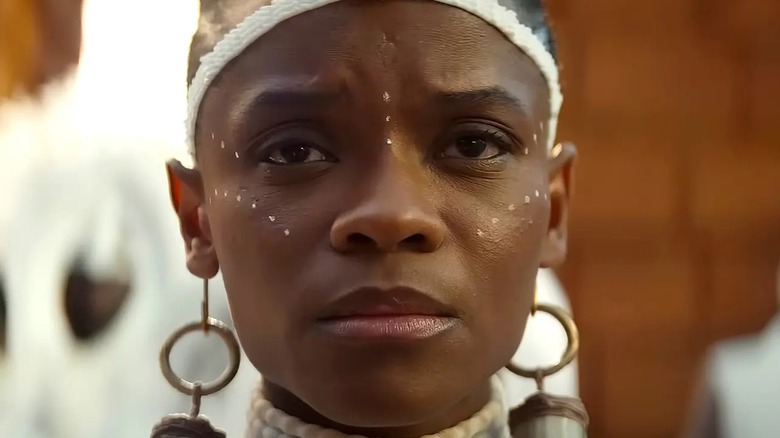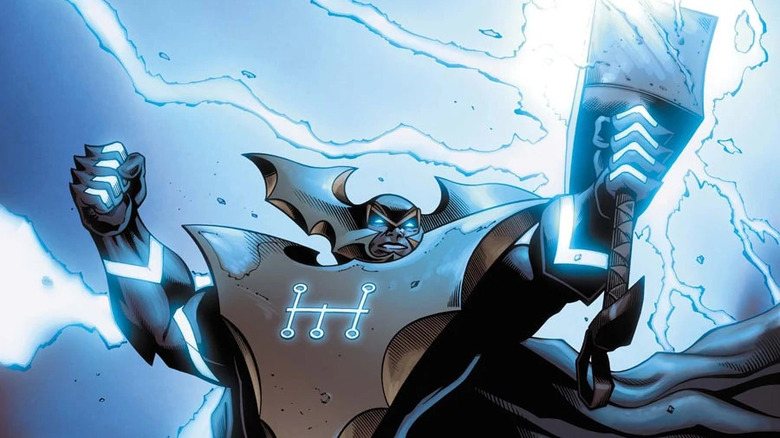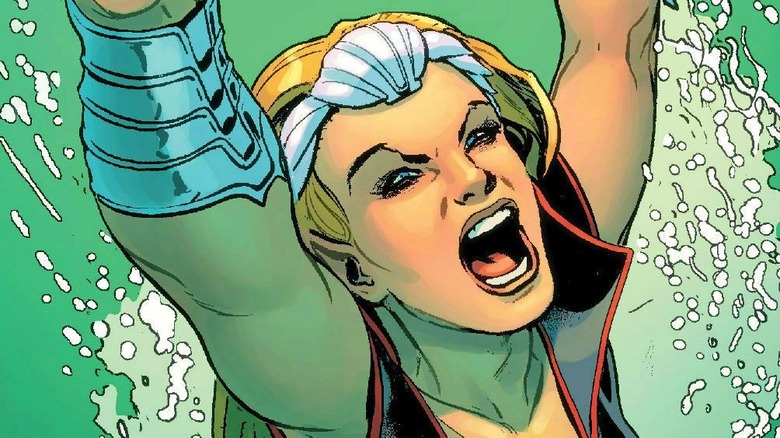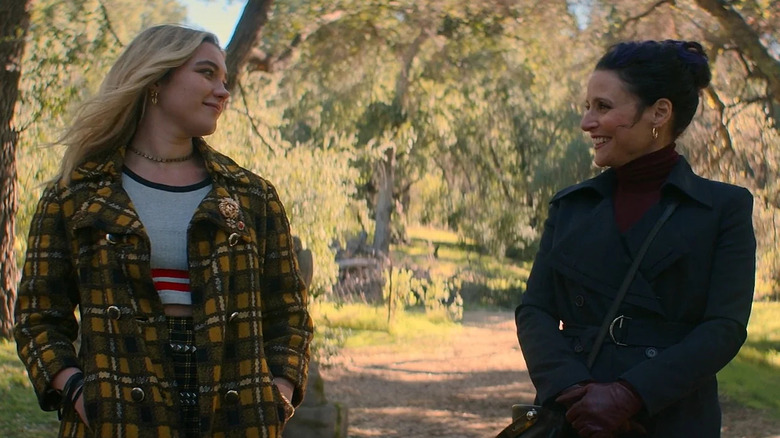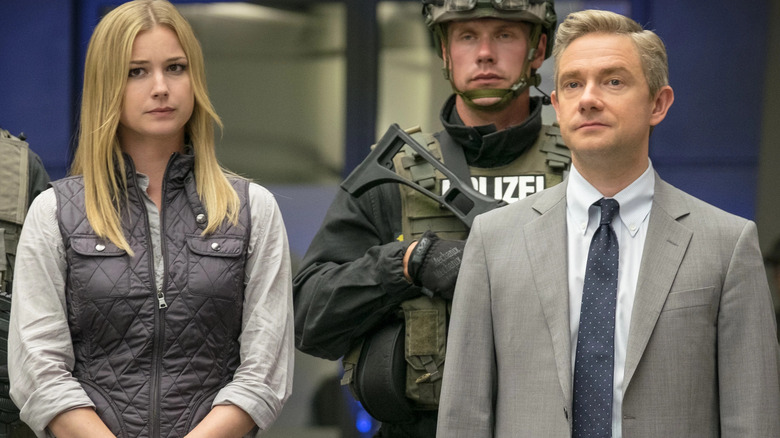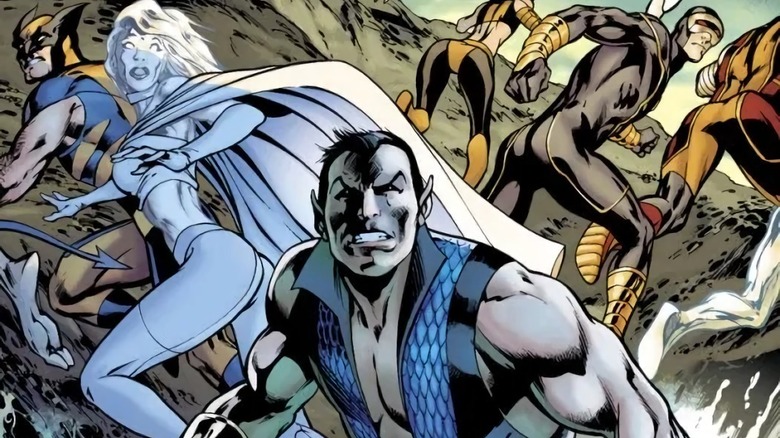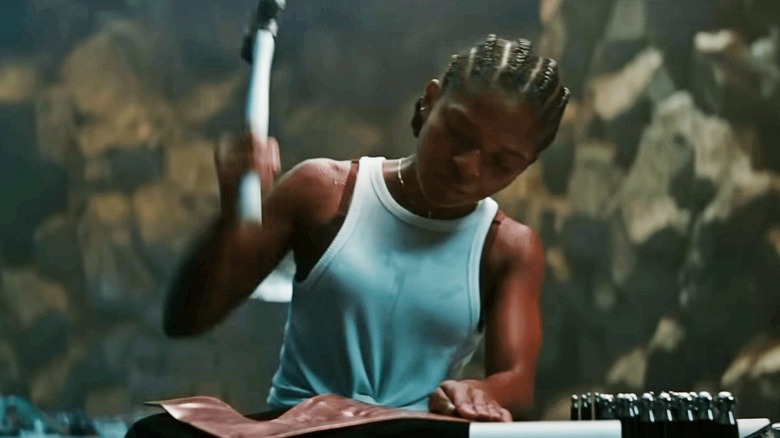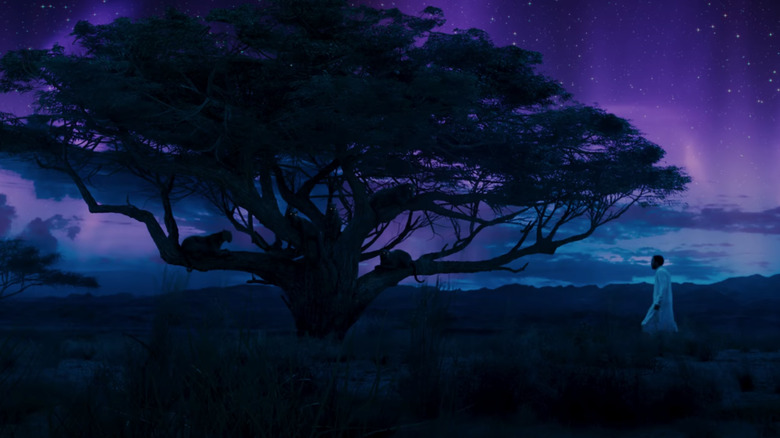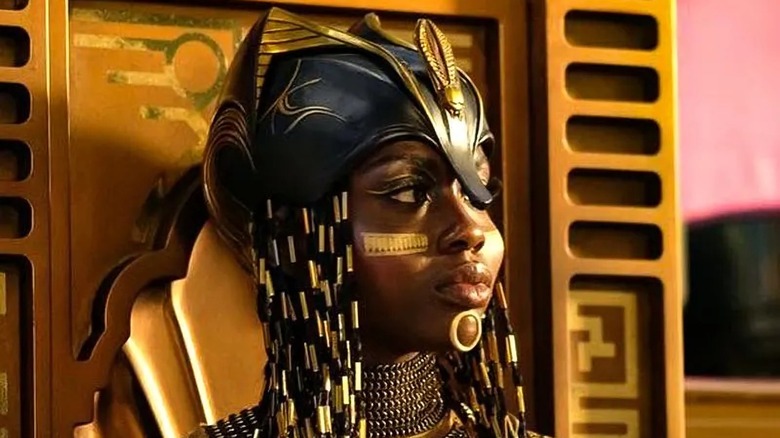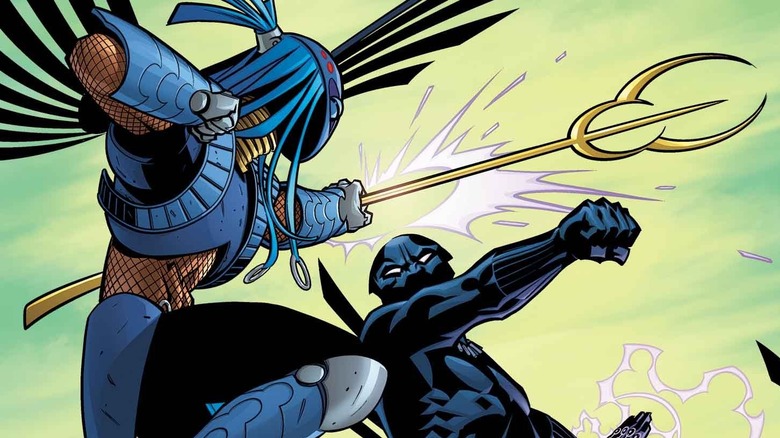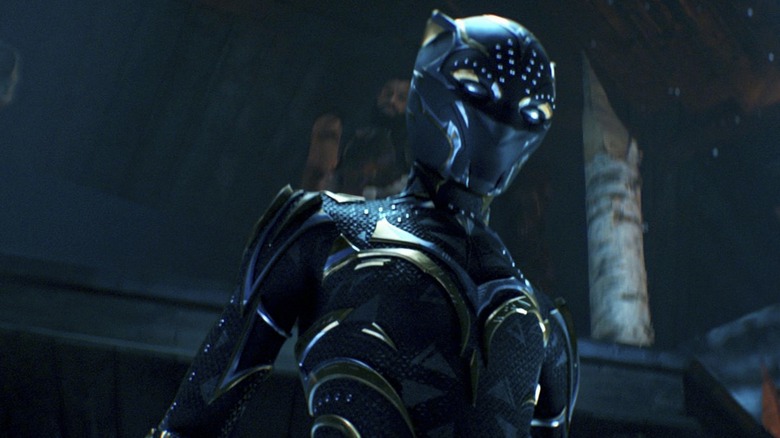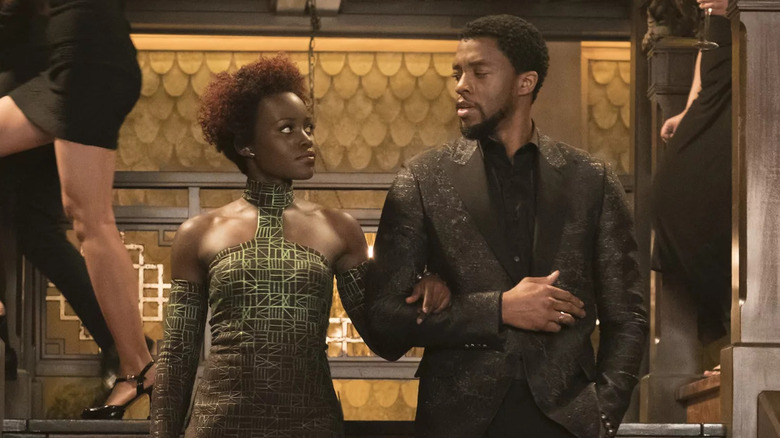Characters In Black Panther: Wakanda Forever That Are More Important Than You Think
In 2018, the Marvel Cinematic Universe added perhaps its most culturally important film, "Black Panther," which critics met with near-universal praise and audiences met with over $1 billion in gross earnings. Everything from its costumes, sets, cast, score, and story marked important milestones for the MCU and for tentpole films as a whole. Bolstered by the vision of director Ryan Coogler and the quiet strength of lead actor Chadwick Boseman, the first "Black Panther" raised the bar for representation in superhero movies without sacrificing an ounce of quality. As hard as it may be to believe, "Black Panther: Wakanda Forever" ratchets up both the quality and cultural significance.
With the introduction of Namor aka the Sub-Mariner (Tenoch Huerta), Riri Williams aka Ironheart (Dominique Thorne), and all the other major additions to the MCU's roster, "Black Panther: Wakanda Forever" promises to go forward into fun, fresh new directions. Especially given the long comic book history that some of these characters have, they may mean more to the MCU's future than you might assume. To help reveal some of this potential, here are 11 characters in "Black Panther: Wakanda Forever" that are more important than you think.
Attuma
We meet the ocean-dwelling race, the Talokanil, long before Namor hits the screen in "Black Panther: Wakanda Forever." In that first encounter, a Talokanil strike force destroys an American science station and ruthlessly murders its entire staff — soldiers and scientists alike. The strike force is led by an individual who practically screams leader: He's bigger than his fellow Talokanil, wields a far more ornate spear, and is uniquely adorned with large, bright feathers and jewelry. As revealed later in the film, that hulking warrior is Attuma (Alex Livinalli), one of Namor's chief lieutenants, and his comic book counterpart is even more fearsome.
Unlike the movie version of Attuma, the comic Attuma is no silent, obedient follower. Instead, he's a big, brash, bellicose barbarian whose life's goal is to wrest the throne from Namor — a feat he has actually accomplished multiple times. Raised to believe himself a prophesied god-king, Attuma has also led multiple campaigns to conquer the surface world. Perhaps the single most revealing example of Attuma's destructive potential came during the "Fear Itself" event, in which the evil brother to Norse God Odin sends eight hammers to Earth — similar to Thor's Mjolnir — meant to empower those most worthy of serving as his agents of destruction. Attuma was granted a hammer, alongside others deemed worthy, including the Thing, the Juggernaut, and the Hulk.
Namora
During the same sequence in which "Black Panther: Wakanda Forever" introduces us to the fearsome soldiers of Talokan and the mighty Attuma, it also reveals Namor's most-trusted advisor: Namora (Mabel Cadena). Clearly a powerful warrior herself, Namora nonetheless serves her people more as a commander and strategist, suggesting an intelligence significant enough to outshine her skills with a spear, and one prodigious enough for Namor to rely on. For all her obvious skill and strength, however, Namora's role in the film is more than just a formidable opponent. Like Namor, the comic book Namora is a half-Atlantean/half-human Mutant, potentially every bit as powerful as the King himself, and attached to a number of characters and groups not yet introduced to the MCU.
Namora is already an important figure in the MCU for possibly being a mutant, and supplying a female counterpart to a major world leader like Namor. Yet she means even more to the MCU due to the myriad comic book connections she brings with her. She has served on teams with notable MCU absentees such as Sabretooth, Kraven the Hunter, and Angel, and has even been romantically linked to Hercules, the Greek God recently introduced in a post-credit sequence of "Thor: Love and Thunder."
Valentina de Fontaine
Way back in "The Falcon and The Winter Soldier," Marvel introduced Valentina Allegra de Fontaine (Julia Louis-Dreyfus), a shadowy figure with mysterious intentions who operates in the background of the MCU. In her first appearance, she recruits the U.S. Agent to the unnamed organization she works for, and in her second, she pits Yelena Belova against Hawkeye in an apparent bid to gain Belova's favor. However confusing her aims are in canon, behind the scenes, it is revealed that she's working to assemble the notorious anti-hero squad, the Thunderbolts. Now, after her appearance in "Black Panther: Wakanda Forever," it's more obvious than ever that de Fontaine will be an important part of the MCU's future.
We finally know who de Fontaine works for: the CIA. Just as importantly, we now know that she is the organization's director. However insidious she might have seemed before, de Fontaine is now confirmed to be a major power player, and the Thunderbolts she is set to assemble are almost certainly going to be agents of the American government. The extent to which super-teams are beholden to world governments has been an explosive issue in the MCU before — forming the backbone of "Captain America: Civil War" and the subsequent Sokovia Accords — and the impending de Fontaine-led Thunderbolts may just relight the fuse.
Everett Ross
Martin Freeman's character, the CIA agent Everett Ross, has been a part of the MCU since "Captain America: Civil War," where he oversaw compliance with the Sokovia Accords and the imprisonment of the Winter Soldier. After that, his appearance in "Black Panther" established him as one of the very few — in Shuri's own words — "colonizers" trusted by the nation of Wakanda. As a high-ranking member of the American intelligence community, a personal acquaintance of many Avengers, and a rare ally to the Wakandan royal family, Ross was important before "Black Panther: Wakanda Forever" began. Then, the movie added another wrinkle in the geopolitical force that is Ross: he and CIA director de Fontaine used to be married.
The news comes out during a car ride the two share, painting their every interaction from then on in a different light. Though de Fontaine is already Ross's boss, and a demanding one, to begin with, her words carry a personal venom. That venom carries through when de Fontaine bugs Ross, fires him from the CIA, and arrests him, and there is every reason to believe it will still be a factor when she inevitably gains control of the next big super-team, the Thunderbolts. With Ross set to return in "Secret Invasion," his relationship with de Fontaine and the loss of his CIA status may come into play sooner rather than later.
Namor
Of course, it goes without saying that Namor is already one of the most important characters in "Black Panther: Wakanda Forever." He's the primary antagonist of the film, the main foil to Shuri in her new role as Wakanda's Queen, and the head of a new, advanced nation, Talokan. Aside from Shuri herself, no character in the movie is nearly as important as Namor, and certainly no newly introduced character can hold a candle. But there are two aspects to Namor, one in the film and one in comics, that make the character more important than you might think: He's the first open Mutant in the MCU, and his comic book counterpart is the only character in Marvel history that has been an Avenger, X-Men, Defender, and Illuminati member. And that's just the tip of the deep-sea iceberg.
The biggest moment in Namor's movie appearance comes when he explains his birth to Shuri, telling her, "I was a mutant." Never before in the MCU has any character been openly, plainly identified as a mutant — Charles Xavier appeared in "Doctor Strange in the Multiverse of Madness" but came from another universe, and Kamala Khan had "something different" in her genes, "like a mutation," but that's it. Likewise, his presence invokes his comic inspiration, who is perhaps the last of the leading anti-heroes to make it to the big screen.
Riri Williams
It's been years since fans of the MCU began speculating about an eventual Young Avengers project. As far back as the 2015 introduction of Cassie Lang in "Ant-Man," fans have proposed theories about its potential lineup. To the delight of fans, Kevin Feige and the other MCU architects have since introduced one potential Young Avenger member after another — Wiccan, Speed, Elijah Bradley aka the Patriot, Kate Bishop, Kid Loki, America Chavez, Ms. Marvel, Stature (the aforementioned Lang daughter), Skaar — and possibly even Axl and Love, the children of Heimdall and Thor, respectively. Now, with the introduction of Riri Williams aka Ironheart, the lineup is more than ready to birth a new franchise. Even more importantly, with Ironheart's introduction, all of the original six Avengers now have a Young Avenger counterpart.
Though the MCU was born with 2008's "Iron Man," the franchise as an intricate, connected world began in 2012's "Avengers," which stars Iron Man, Captain America, Thor, Hulk, Black Widow, and Hawkeye. Captain America has a younger counterpart in Elijah Bradley. Hawkeye (Clint Barton) has Hawkeye (Kate Bishop). Black Widow (Natasha Romanoff) has Black Widow (Yelena Belova). The Hulk has Skaar. Thor has his daughter Love and, perhaps surprisingly, Wanda's son, Wiccan — who first appeared under the name "Asgardian," named after Thor. Now, Iron Man has more than the aging War Machine: He has a true Young Avenger in the form of Ironheart.
Killmonger
A joyful surprise to many, Michael B. Jordan's hit character Erik Killmonger made a cameo in "Black Panther: Wakanda Forever" and with it, clarified a number of questions about Wakanda's Ancestral Plane — as well as creating just as many new questions. When Shuri ingests the Heart-Shaped Herb in order to gain the physical ability of the Black Panther and commune with former Panthers in the Ancestral Plane for guidance, it's Killmonger who awaits her there.
Unlike T'Challa, who met with his recently-departed father T'Chaka, and T'Chaka, who supposedly met with his father, Shuri's vision in the Ancestral Plane broke tradition entirely. Due to the rage in her heart and her overwhelming urge for vengeance, she meets with the most vengeful former Panther, Killmonger, who tries to stoke the flames of anger in her heart.
His presence on the Ancestral Plane makes one thing crystal clear: Every Black Panther ascends to the Ancestral Plane upon death, regardless of their actions in life. For all of Killmonger's supposed villainy, he exists forever right alongside the most virtuous of historical Panthers. From there, the potential implications are as troubling as they are varied — is all that is required to reach this paradise the drinking of the Heart-Shaped Herb? Are all paradises, like Heaven, Valhalla, and the Duat, subject to similar technicalities?
Bast
Dozens of times throughout the first "Black Panther" and "Black Panther: Wakanda Forever," Wakandans cite Bast as their principal deity. Their central myth revolves around the first Black Panther, Bashenga, receiving a vision from Bast that guided him to the first Heart-Shaped Herb, granting him powers and making him king. Since then, Bast has acted as a psychopomp for all Wakandans, transporting the spirits of the newly dead to a peaceful green valley where they will remain forever in happiness.
Like the deities of many cultures, Bast is only considered real by a fraction of Wakandans, with many others citing the god in either ritualistic or metaphorical contexts only. However because Marvel is Marvel, and nearly anything you can imagine is real somewhere, we've actually seen Bast before and in person. Like many other Marvel gods, she is completely real.
When Thor, Korg, Jane Foster, and Valkyrie visit the Council of Godheads in "Thor: Love and Thunder," Bast is seen in attendance, as real a being as Thor or any other god present. That makes Bast more important than ever before, because she may end up playing a role far beyond simple evocation and prayer — she might very well participate in Marvel adventures in person like Thor, Khonshu, Hercules, or any number of gods from various pantheons.
The Midnight Angels
As tensions between Talokan and Wakanda rise going into the third act of "Black Panther: Wakanda Forever," Shuri breaks out every tool in her arsenal. Alongside a massive battleship, a new set of superpowers, and a Black Panther suit, Shuri finally puts one of her longtime pet projects to use in the field: the advanced combat suits codenamed "Midnight Angels." Firstly, the suit proves the irony and flaws in Shuri's fragile mental state. Despite her repeated insistence that the Black Panther suit — a full-body suit that augments strength, speed, and reflexes — is obsolete in the wake of new technology, her substitute idea is the Midnight Angels: full-body suits that augment strength, speed, and reflexes. But beyond that character reveal, the Midnight Angels have even more importance, thanks to their activities in the comics.
Among Earth's warriors, the Wakandans are some of its most elite, and among them, the Dora Milaje are their most elite. The comics take this stratification one step further, naming the most elite among the Dora Milaje the Midnight Angels. Not only are they the best of Wakanda's best, but they are also its most loyal — so loyal, in fact, that they even attack T'Challa, Shuri, and the entire royal family when it seems that they've acted against the interests of Wakanda at large.
Shuri, the Black Panther
It isn't news that Shuri is an important part of "Black Panther: Wakanda Forever." In fact, she's the main character and star of the film, the one we're meant to empathize with the most, and the one whose perspective and experiences frame the story. Yet no matter how important Shuri is as a protagonist, Wakandan, or Queen, she becomes infinitely more important the moment she takes on the mantle of the next Black Panther.
Similar to how Ironheart finally completes the list of Young Avengers counterparts to the original six Avengers in 2012's "Avengers," Shuri's ascension to the rank of Black Panther completes another major list: female successors to every original Avenger, and indeed every major Avenger. Captain America has Captain Carter. Thor has Lady Thor (Jane Foster). Iron Man has Ironheart. Hawkeye has the female Hawkeye. Black Widow has another female Black Widow. The Hulk has She-Hulk. And now, the last remaining lead Avenger, Black Panther, has Shuri, the first female Black Panther. The possibility that the MCU could incorporate an all-female movie, whether it be "A-Force" or not, is higher than ever.
Prince T'Challa
Unlike many Marvel films, "Black Panther: Wakanda Forever" only has one post-credits scene, and though it is slow, subtle, and quiet, it is nonetheless tremendously important to the MCU's future. Instead of some new, dire threat or the introduction of another already-beloved hero, the sole end-credits scene honors Boseman and T'Challa by introducing his son with longtime love Nakia (Lupita Nyong'o), who introduces himself as "Prince T'Challa, son of King T'Challa."
Sure, other Avengers have children, but none have been introduced at a period that imbued them with so much gravity and so much potential. As the son of T'Challa, the young T'Challa ensures that his father's legacy will live on. But perhaps more importantly to a superhero franchise, as the son of a super-powered individual, it is possible and even likely that the young T'Challa inherited his father's abilities. We've mentioned before how stacked the potential Young Avengers roster could be going forward, and now it could very well include a Panther-powered son of Wakanda, as well. In carrying on the legacy of King T'Challa and possibly ensuring the future of Wakanda in the superhero community, the young T'Challa joins the ranks of characters in "Black Panther: Wakanda Forever" that are more important than you think.
